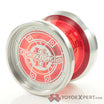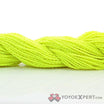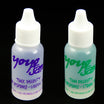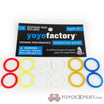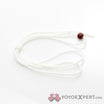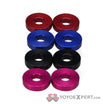Yeah, I agree.
I think I’ll do some glue ups and stress tests, like drops onto concrete at various heights and squeezing halves together in a vice and flinging it on a string into the ground.
I found Ipe and Cumaru available locally as surprisingly affordable pen blanks. Basically the same price as walnut. The black locust isn’t available in my city, but I found a series of dedicated black locust suppliers that can source it very affordably.
This makes me think the black locust might be the good all-around candidate since it has a medium grain texture and a janka of 1700 that’s relatively closer to yellow birch (1260) or Tasmanian oak or white oak (1350) than Ipe and Cumaru (which are 3300+). Plus, it’s not oily, which avoids that potential issue.
I was thinking that the modulus of rupture might also be important. Basically, I want an axle that can withstand responsive counterweight play and all that entails. Black locust is higher MOD than a lot of common axle woods. I also have yellow birch blanks on hand, and they seem to be work really well as axles. Surprisingly, its janka and modulus of rupture are higher than walnut even though it seems to play softer and more responsive. And its modulus of rupture is also higher than white oak.
I guess some stress tests and play tests is the way to find out.
Modulus of Rupture also sounds like a good metal band name.
Can you drive down and buy white oak or yellow birch dowel in the right diameter from your local hardware store? If you can, just use that.
Unfortunately almost everything locally is either 1/4” or 3/8”. The only thing available in 5/16 is undifferentiated birch, and I suspect that it’s white birch based on a fingernail test. 1/4” walnut is readily available, but I’m very ready to move to something thicker.
OK, thats a bummer. Perhaps put an online order in for a local supplier. For convenience, you will really want dowel in the right diameter rather than turning your own.
I just found an online supplier that sells 5/16” dowels in walnut, maple, and hickory. They come 6 inches long and are made for Turkey call strikers. I had no clue what that was, but it’s definitely worth a YouTube search.
I also turned some Osage orange and Ipe dowels to test
Plus a CNC hole-size accuracy test.
Is there a recommended wood for wooden yo-yos in. high humidity environments? Not sure if it makes a difference whether responsive or unresponsive, again in high humidity. I did real in Glen’s post further above that hardness of wood can impact response.
How accurate are the CNC holes?
We have very high humidity in SE Texas. I have maple and now wenge. I unfinished maple with Tru-Oil. It hasn’t had a problem. The wenge is too new to know yet. The two other maple throws came pre-finished.
I’ve wondered that. I have a Spinworthy Button and live in a SUPER humid space. It’s towards the end of summer now, and its performance has been great.
The holes require a slight amount of radial compensation depending on the wood density.
The bit bends as it makes contact with harder density woods?
So I’ve had this potentially controversial opinion for a while now and I’ve tried to generally be low key about it. – I think that handmade yoyo makers, specifically SW, Gates, and also TMBR, have the potential to charge more for their yoyos. While many well-made metal yoyos regularly go for more than $100, for some reason people don’t associate the same value with handmade yoyos. Though they may have lower material and equipment costs, there is a significantly higher investment in the manual labour that goes into crafting each individual yoyo.
This is actually a wider issue that I’ve observed throughout craft “handmade” goods where frequently consumers have an unrealistic understanding of the value of something that is handmade because many people are used to mass-produced prices. But the only way to truly support makers and allow their craft to be sustainable is to pay more for something like a handmade yoyo. Which I think is completely reasonable and worth it.
@Glenacius_K, you make wonderful yoyos. I completely understand that you may be tired of making yoyos and it is already generous of you to have agreed to make a little more to support the demand of your fans. However, if charging more for your yoyos makes this more worthwhile for you, then by all means charge whatever you need to. Time and experience are valuable assets.
It’s apparently a common problem on hobby-level CNC routers. Small holes often come out too small and require compensation of some sort in the CAM as well as the right combination of roughing and finishing tool paths.
For me it’s probably a combination a using a hobby-size CNC machine, a tiny amount of bit deflection on harder woods, and my inexperience with g-code. It’s only 0.14mm off so it’s not too hard to compensate.
People will buy my woods at resonable prices, but almost nobody will touch my plastic unresponsives for a resonable price.
I can get plastic yoyos anywhere. Options for getting wood yoyos is very limited.
You can’t get my plastic yoyos anywhere. My plastic yoyos are much more unique.
The hand made yoyos I have purchased on this site are heirlooms!
